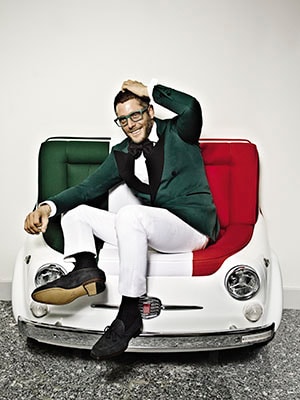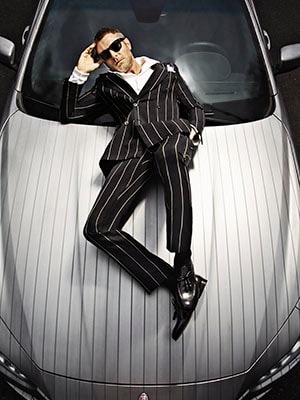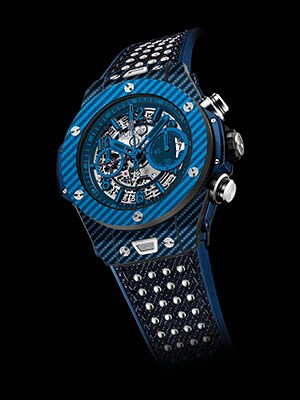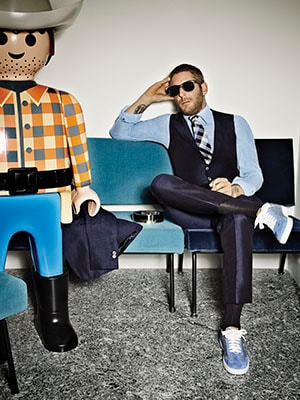
Fiat's wild child and his globetrotting life
After years of outrageous behaviour, Fiat's prodigal scion, Lapo Elkann, has found a new gear designing cars, suits, eyeglasses, watches—and the ultimate globetrotting life for himself
Lapo Elkann blazes into his office on Milan’s Corso Venezia at a hot clip, a few minutes late, issuing a gracious, “Sorry, gentlemen”, in his cigarette-etched rasp. Trays of espresso appear for the people in the office. Elkann slams one down, then another, burns through a couple of Marlboros, rifles through a few papers on and off his desk, issues a few orders and begins to undress. Really undress, as in whipping off his jacket, shoes and pants. It’s swift work.
This much can be simply stated: Elkann approximates the effect of an intense weather cell, one of those heaven-reaching water-spouts that occasionally wreak havoc on the Mediterranean. The centrifugal upsurge is magnificent.
Many things fly by in the vortex around the man: People, ideas, pens, paper, cigarettes, eyeglasses, coffee, more coffee, his Juventus football club lighter (his family has owned the team since 1923), a couple of phones and, right this minute, his pants.
Fair enough, he’s changing into a suit from his made-to-order capsule collection for Gucci—the eponymous Lapo’s Wardrobe, in which he will shortly be photographed—so there’s an ostensible sporting efficiency to the exercise. But still. Would, say, Larry Ellison or Les Moonves dare the instant locker-room familiarity in his office with four or five people standing around? Elkann has no secrets, metaphorically or otherwise, or not many that he doesn’t automatically reveal.
The new suit is a peacocky double-breasted chalk stripe and could almost pass as bankerly. But the stripes are set gangster-wide, so it seems more appropriate for the gentleman who might be relieving the banker of his funds.
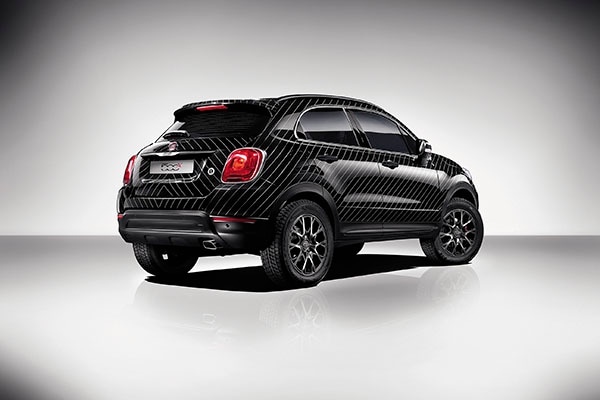
The Garage Italia-designed Fiat 500x with a black tie wrap paint job
It bears both a retro- and future-time-travel appeal—simultaneously evoking something you might see on Cab Calloway at the Cotton Club in the ’30s and on a villain in the next Batman movie.
Under the suit, Elkann has styled a counterpoint to the gangster formality with a white open-necked terry-cloth shirt that has a huge floppy collar, the kind of top that Picasso might have worn on the beach in Antibes with Françoise Gilot. For his part, Elkann has the air of a man fresh off a yacht moored nearby no matter where he is or what time of day you see him. It’s an ensemble that should not work—on any man’s back—but Elkann has the required dollop of native devilry in him, along with his leathery world-weariness, that makes this outfit work.
In a couple of weeks, he will, in fact, jet out to Shanghai to promote Lapo’s Wardrobe—to a perfect market of yacht- , label- and party-hungry swashbucklers. His Asian jaunt can be seen philanthropically, as a kind of men’s fashion world emergency relief mis- sion. No matter how rich and experienced the nouveaux masters of the universe in Shanghai purport themselves to be, it’s fairly certain they’ll need some instruction on how to pull off Lapo’s Wardrobe with his level of sprezzatura.
A second, fresh tray of espresso has arrived, and we are madly recaffeinating. The coffee and Marlboros on his 12-foot-long chequerboard carbon-fibre conference table just might be breakfast, it seems. The Marlboros are the pastry.
At 37, Elkann continues his preternaturally colourful dance along the tightropes of several dizzying career trajectories—entrepreneur, marketer, car customiser, global denim- and eyewear-mogul, vodka distiller, film distributor, menswear designer, watch designer and, not least, Fiat heir. He is a founding father to eight companies in all, six public ones under the Italia Independent Group, in whose offices we sit, plus the privately held Good Films, a producer-distributor that he owns with his sister, Ginevra, and which she runs out of Rome. The last of the litter, born this March and also privately held by Elkann, is Garage Italia Customs, the hip design and fabrication arm for customising cars, aircraft, and boats, globally. Elkann is nothing if not breezily forthright about why there are so many and such diverse enterprises under his aegis and why he’s on the prowl to do more. “A prime motivation for me is love—and I love cars,” he says flatly, and aptly for a great-great-grandson of Fiat founder Giovanni Agnelli.
“Automotive for me is love. So is design. I love shaping cars. I love to see cars from birth. I love it when they come to the market—small, big or huge. I have a real passion working with the designers and mechanics. I’ve helped Ferrari to create the process of tailoring and the one-offs, but the reality is, in a big family company, you don’t always get to do what you want. There are other people in those positions. With the great respect that I have for the Agnelli family and for the Elkann family, I created Lapo, and this is Lapo’s world. It’s not an Elkann or an Agnelli world.”
He puts his fist on his chin, like a Roman senator in a debate, and clicks his blue pen twice as the starting gun for continuing the reminiscence.
“Obviously I have been taught many things by both my grandfathers,” he says. “But the ventures that I take are not with my family’s money—they’re my decisions, my choices, and that’s the way I want them to be. It’s a very separate but kind wall that’s been built, with flowers, between my companies and my family’s companies. I’m still one of the largest shareholders in the family business, with my brother [John, the chairman of Fiat] and my sister, which I look at with very serious eyes, and I’m part of it. But my day-to-day life is building my group, my company, my empire, my story, which I hope one day I’ll be able to leave to my kids.”
He doesn’t have children yet—or a wife—but there should be quite a bit to leave by the time he’s done. Elkann’s literary talent for analysis along with his obvious entrepreneurial gifts—the Italia Independent IPO in 2013 was a solid hit on the Milan Exchange and last year, the company reported revenues of nearly $36 million, a 32.1 percent rise—is delightfully at odds with the knight-errant figure he cuts on the social battlefields, upon which he has long been a closely tracked star. Playboy? Maybe, but it’s mostly just another suit of clothes he can put on or take off. At his core, he’s a peripatetic entrepreneur working out his ancestral gift for empire building.
I ask him how, with the dozens of directions and the many continents to which he’s taking his businesses, he found the time to design the roomful of witty, razor-sharp shirts and suits for Gucci. He cracks a wry smile, blue eyes straight up through his big eyeglasses.
“Once I get to it, I’m very fast,” he says. He’s not kidding, in a couple of ways.
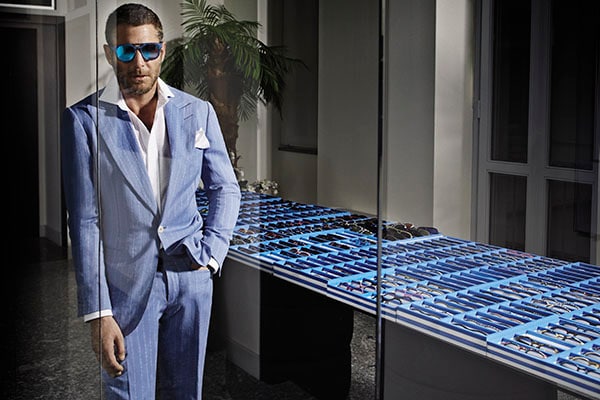
First, the empire-building has taken place in just eight years. In 2005, he emerged from drug rehab and lived on the mend in New York. Although he had long been toying with some of the ideas that ultimately became the Italia Independent Group, his recovery formed the crucible in which he crystallised them. He co-founded Italia Independent in 2007. For Elkann, the next few years were a ferocious burst of business-making, with the required globetrotting to seal partnerships and service commitments in Brazil, Asia and America.
Not a bad business and personal renaissance for an heir who narrowly missed taking himself entirely out of play via the well-worn cliché of almost killing himself partying, with a drug overdose. Although it’s clear that irrepressible character is irrepressible, and that Elkann remains the gloriously kaleidoscopic man he always was, the close call has obviously layered in a deep operating wisdom, and he seems most gratefully devoted to using those hard-won tools.
“It’s great to do things that you love,” he says. “But it’s also great to do things you love where you understand that you have some space and there are other people that are not yet capable of doing what you want to do. Being creative today is also being an entrepreneur. It’s great to take risks. But risks have to be taken after having seen the opportunity arise. If not, danger,” says Elkann.
“I’ve moved into cinema with my sister,” he continues. “Last year, we distributed Dallas Buyers Club, Lars von Trier’s Nymphomaniac and Still Alice. It’s knowing there is a way of doing something better.”
Consider his approach to eyeglasses with Italia Independent. “Why have I chosen eyewear?” he asks. “Glasses are a way, first of all, to protect your soul from others. Second, it’s an industry of which we Italians can be most proud. Everyone said to me, you’re crazy, you’re going into a closed industry, they’ll kill you and squeeze you. And it is not a cup of tea, the business. But we’re not in the luxury market. Some of these frames cost $80. We’re in the affordable luxury market, which I think is very much part of the future. All sorts of people like them. Karl Lagerfeld wears the pair trimmed in fur.”
Elkann’s personal velocity shows in more than just the execution of his business ideas. Partly for Garage Italia, but partly because he’s just a classic pistonhead with genetic high-octane in his veins, he’s plotting a return to the Autodromo di Monza test track in a Ferrari 456 GT2. Or put another way, despite last September’s bone- crunching motorcycle wreck, he’ll be satisfying his velocity jones with another few dozen bursts down straightaways at 150 mph.
If one is around Elkann for long, it becomes clear that the eddies and gusts of events around him are just the shape of his wake, the disturbance coming off him as he slices through the waters of life at speed. He’s in whatever’s happening, but he’s so fast that he also seems in any given moment to be beyond that moment. Outwardly, he reserves his formidable impatience for himself, but there’s a strong sense that he’s always, silently, calling out “Next!”
“I think the automotive world, the big manufacturers, need to wake up,” he says not far from one of several love seats he has had fabricated from sawed-off vintage Fiat 500 engine bays. “All people want their things their way. When I move through the world, I want my things my way. Whether you’re old, young, male or female, there is a range of things that you like and things that you don’t like about any of your vehicles. We can change all of that. In fact, Garage Italia does not restrict it to cars; let’s take your boat, your jet ski, your motorbike, your 4x4, your helicopter, your Gulfstream and fashion it the way you like it.
“At this level of the market, there’s no limit. We’ve only been up and running for a few months, but we’re in the fortunate position of having to turn down jobs. We can do it anywhere, to any kind of vehicle on earth and deliver anywhere on earth. It’s a global design push.”
Or, in American terms, an air-sea-land version of Pimp My Ride. Garage Italia’s splashy debut was at this March’s auto show in Geneva, where Elkann and his 15 core designer-builders chose to deliver a hilariously elegant Fiat 500, the recently redesigned iconic Fiat “bug” of the late ’50s and early ’60s. The Turin factory had tweaked it into a very sleek, handy, mid-range urban gadabout, much as BMW tweaked the Austin Mini. In Geneva, Elkann presented it with his customary brio as the ‘Black Tie’ Fiat 500X, with tuxedo fabrics, cashmere and leather trim, and excellent black-on-black-striped “wrap paint”. Which is something nobody expected in the mid-range. That was his point.
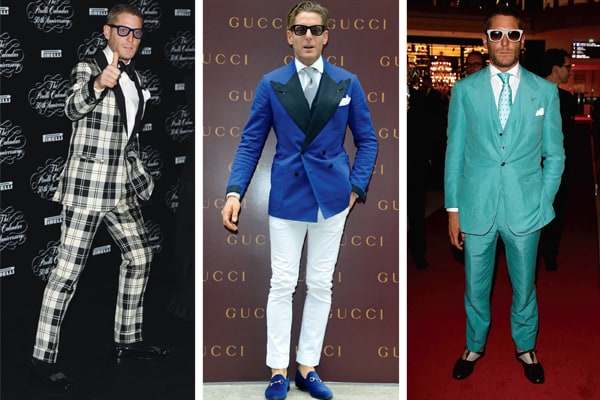
Human kaleidoscope: Long considered as one of the world’s best-dressed men, Elkann is influenced by the style of his grandfather, Gianni Agnelli
“The wrappings are amazing,” says Elkann. “And we’re investing a lot in R&D of paint. But really what we can offer is an infinite palette. Let’s say you want something seasonal. One car one way for summer and another car, fitted another way, for autumn. We change our clothes seasonally, don’t we?” Elkann hides little, or put another way, uses transparency at speed very adroitly. His formidable corporate life aside—Garage Italia, the IPO, the eyewear line’s expansion to Brazil and Japan, and his partnership with Adidas and a new deal with Hublot—Elkann’s social life is, also, lived with a certain supersonic tact. As he is minutely and breath- lessly portrayed in the Italian gutter press, social media and fashion pages, “Lapo”—the phenomenon, not the man—is a comet-like body streaking across the Italian heavens.
Rendered economically, in addition to his companies, Elkann is also an employer of countless paparazzi and their editors. Vanity Fair Italia has a web page devoted to “Tutte le ex di Lapo Elkann”, chronicling his past decade of international affairs. He claims to be dating no one person steadily now, although, with summer on the Mediterranean having kicked off, the rabid-for-Lapo European tabloid editors and their camera-wielding centurions remain on red alert at fashionable airports, harbours, bars, restaurants and resorts continent-wide.
His office décor is evidence of Elkann’s giving no quarter to the paparazzi or, more pointedly, to their bosses. Each year, the Italian satirical TV show Striscia la Notizia (The Slithering Snake of the News) presents a “golden tapir” to a celebrity for his or her heavily documented and outrageous behaviour. In other words, the gutter press is awarding a celebrity for the most impressive gutter press coverage. The golden tapir statue, which stands ass-up, nose to the ground, is supposed to be a mark of shame, as measured by column inches and level of theatricality in daily life. Dominating the recipients’ field, Elkann has garnered four golden tapirs, all exhibited prominently—arranged with their faces to the wall—on his office book table, alongside his beloved automotive books. In other words, he’s not had an assistant chuck the tapirs in a dumpster, as any number of moguls would in a huff. Elkann has no “huff”.
As for his press clips, good, bad and indifferent, he’s had a selection of them printed as wallpaper, with which he has lined the hall leading to his door. Taken together, the wallpaper and the tapirs are a celebratory act of defiance: You think you’ve caught me, but there’s no way you will—so bring it.
But it’s important to know that there’s a larger, more legitimate historical reason for the unending attention of the Italian press. It is that—in Italy, metaphorically speaking—Elkann is descended from God. There were not many titans of industry in 19th-century Italy—there was certainly no automotive industry in southern Europe at all—as Giovanni Agnelli, Elkann’s great-great grandfather, invested in and then later became chairman of Fiat. If we add Elkann’s eternally stylish 20th-century grandfather Gianni—who ruled Turin for decades—in the Agnellis we have the family that, above all others, brought Italy into the modern age. In Elkann, then, we have a pure industrial deity who is just now realising his own powers.
We take a quick ride around the corner on an errand in his throaty Garage Italia-customised Maserati—kitted out with a silver-grey pin-striped paint job and black worsted wool pinstripe uphol- stery. We decide to walk back. Walking is complicated for Elkann right now, because, in line with the theory of velocity in his life, he’s more than a little stiff from that motorcycle crash a few months ago. He just recently got off his canes, so there’s a bit of a limp left.
“I have to be a little careful,” he admits.
He once hilariously described himself as a “French Turinese Neapolitan Catholic Jew born in New York”, and he is all of that. But he bears the aquiline profile and the swift, careless sartorial perfection of his legendary grandfather Gianni. Elkann’s visage is the DNA image of his forebears. All of Italy recognises this nose, these eyes, the silhouette of this face.
Milan’s business morning is fully underway as we undertake our walk—against us in the sidewalk crush come two well-splattered painters, in their white overalls, on a coffee and cigarette break.
“Ciao, Lapo,” they say, with not a little familiarity behind it.
“Ciao,” he says, “how are you, gentlemen?” Fifty paces farther, two imposing carabinieri. “Ciao, Lapo,” they say.
“Ciao.”
If he kept walking, he’d be greeting tutti di Milano in this old, familiar, 19th-century manner. It’s a great testament to his hometown role and to the public recognition that this is indisputably Elkann’s patch of earth. However, mosaically extravagant his life is, it’s their country and its industrial history that the police and painters address as they are moved to acknowledge him.
“So, you were born in New York,” I say to him as we round the corner to his office.
“Yes,” he volleys quickly, “but I’m Italian.” As he strides up to the bar in the cafe downstairs from his office, Elkann, ever the gentlemanly host, asks, “Care for a sandwich? I think we could all use a little something. Let’s order up a few.”
Back upstairs with our panini, downing more espresso, Elkann is moved to add the grace note. “I don’t deny my inheritance,” he says. “I don’t deny the luxury and the opportunity I’ve had to see beauty, to seek beauty or to learn from people. But there’s a mo- ment in life when it is time to make your life, to work on the things that you want to work at. The reality is that I couldn’t do all that I wanted to do in the family company, so I decided to do the things that I want to do on my own. This is just the beginning,” he says, pausing to click the cap of his pen.
“I’m not someone who likes to stop.”
(This story appears in the July-Aug 2015 issue of ForbesLife India. To visit our Archives, click here.)
